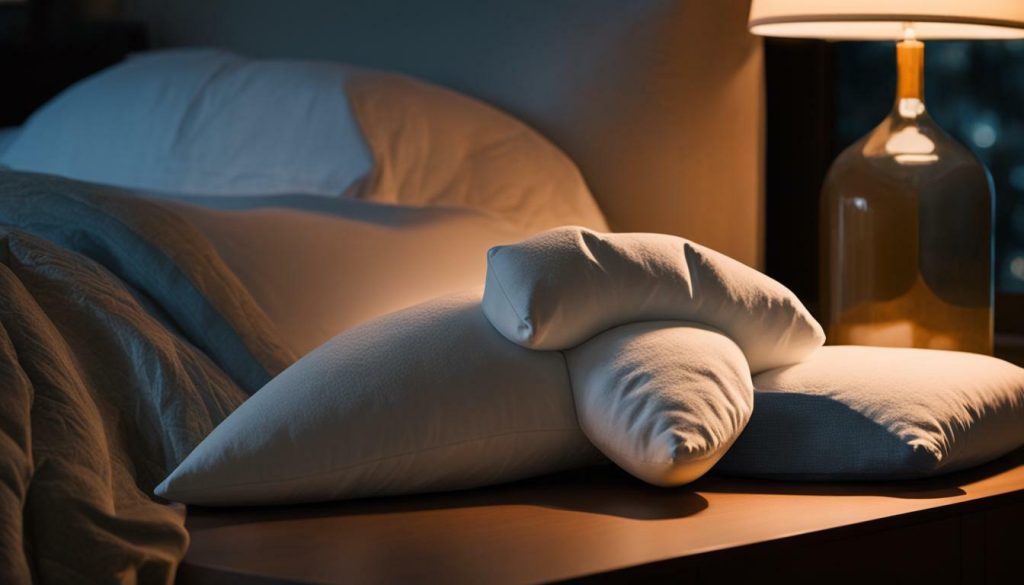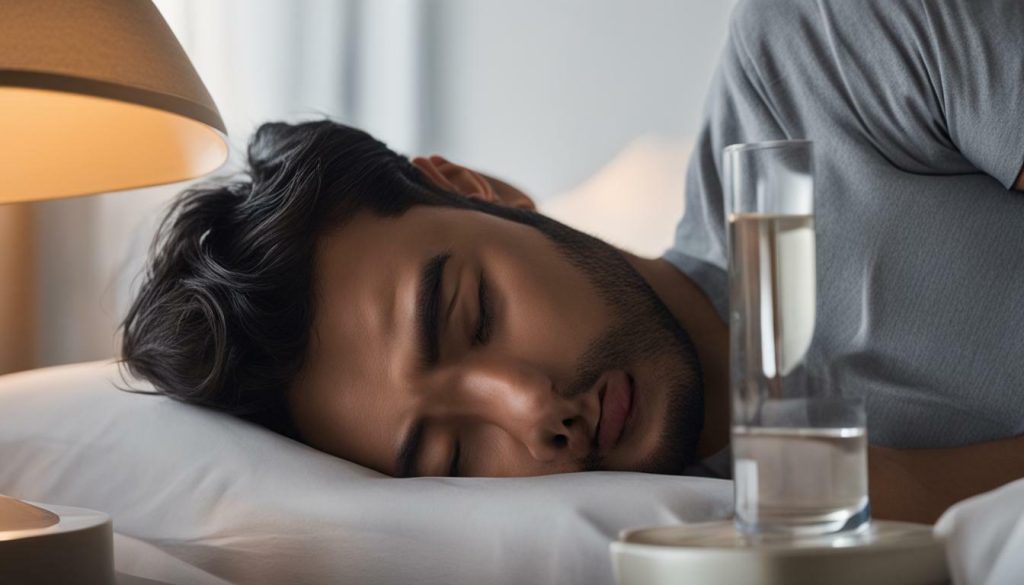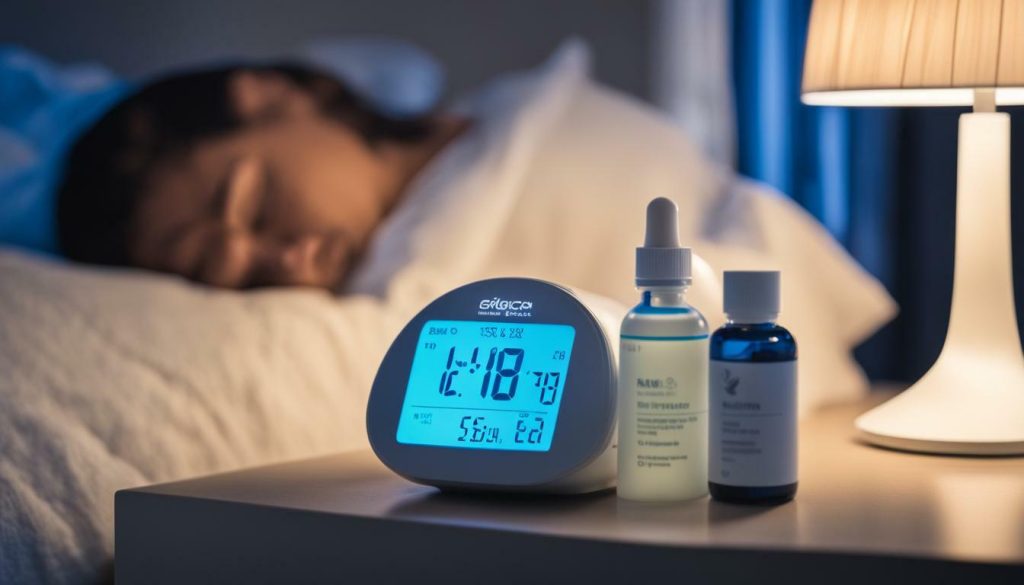Struggling with an ear infection? Learn how to sleep with an ear infection comfortably by following these effective tips.
Sleep plays a crucial role in our overall well-being, but when you’re dealing with the discomfort of an ear infection, getting a good night’s rest can be challenging. The pain, pressure, and disrupted sleep caused by an ear infection can leave you feeling exhausted and drained. However, there are several strategies you can employ to help alleviate the discomfort and promote a more restful sleep.
Here are some effective tips to help you sleep with an ear infection:
Key Takeaways:
- Elevate your head and sleep upright to promote drainage and relieve pressure in the middle ear.
- Take over-the-counter painkillers like paracetamol or ibuprofen before bed to alleviate ear infection pain.
- Sip water and do swallowing exercises to trigger the muscles of the Eustachian tubes to open and drain.
- Switch sleeping positions and avoid lying on the affected ear to reduce discomfort and pressure.
- Manage allergies and congestion to improve sleep quality.
By incorporating these tips into your bedtime routine, you can create a more comfortable sleeping environment and promote better rest despite the challenges of an ear infection. However, it is important to remember that these tips are not a substitute for medical advice. If you are experiencing persistent or severe symptoms, it is crucial to consult a healthcare professional for proper evaluation and treatment.
Stay tuned for the upcoming sections where we’ll delve deeper into each tip and provide you with actionable strategies to sleep with an ear infection comfortably.
Elevate Your Head and Sleep Upright
One effective way to find relief and improve sleep quality with an ear infection is to elevate your head and sleep in an upright position. By doing so, you can help drain fluid and relieve pressure in the middle ear, reducing discomfort and promoting a better night’s sleep.
To achieve this sleep position, consider using additional pillows or an adjustable bed to provide support. Place the pillows or adjust the bed in a way that allows you to sleep in a semi-upright position, with your head elevated above your chest. This angle can aid in the natural drainage of fluid, helping to alleviate pain and pressure in the ear.

In addition to elevating your head, it’s important to ensure that you are comfortable while sleeping in an upright position. Find a pillow that provides adequate neck support and helps maintain the proper alignment of your spine. Experiment with different sizes and shapes to find the one that suits you best. Remember, comfort is key to getting a good night’s sleep, even with an ear infection.
| Benefits of Elevating Your Head and Sleeping Upright with an Ear Infection |
|---|
| Drains fluid from the middle ear |
| Relieves pressure and discomfort |
| Promotes better sleep quality |
| Reduces the risk of worsening infection |
Remember, while sleeping upright may provide relief, it’s important to consult a healthcare professional for appropriate treatment of your ear infection. They can provide guidance on managing the infection and recommend any necessary medications or therapies to help you recover.
Take Over-the-Counter Painkillers Before Bed
To ease the discomfort of an ear infection while trying to sleep, consider taking over-the-counter painkillers before bed. Medications like paracetamol or ibuprofen can provide temporary relief from the pain and allow you to have a more comfortable sleep. However, it is important to follow the recommended dosage and consult a healthcare professional for guidance.
The use of over-the-counter painkillers can help reduce inflammation and alleviate the pain associated with an ear infection. They work by blocking the production of certain chemicals in the body that cause pain and swelling. By taking these medications before bed, you can help ensure a more restful night’s sleep.
Remember, it is essential to read and follow the instructions on the packaging of any medication you take. If your symptoms persist or worsen, it is recommended to seek medical advice from a healthcare professional.
Table: Recommended Over-the-Counter Painkillers
| Painkiller | Recommended Dosage | Precautions |
|---|---|---|
| Paracetamol | Adults: 500-1000mg every 4-6 hours | Avoid exceeding the maximum daily dose |
| Ibuprofen | Adults: 200-400mg every 4-6 hours | Do not take if you have stomach ulcers or a history of allergic reactions to NSAIDs |

“Taking over-the-counter painkillers before bed can provide relief from the discomfort caused by an ear infection and improve sleep quality.” – Dr. Emily Johnson, Ear, Nose, and Throat Specialist
Promote Drainage by Swallowing and Hydration
Promote drainage and reduce pain caused by an ear infection while sleeping by practicing swallowing exercises and staying hydrated. Swallowing helps trigger the muscles of the Eustachian tubes to open and drain, relieving pressure and discomfort in the ear. Incorporating these simple practices into your bedtime routine can significantly improve your sleep quality.
Start by sipping water throughout the day to stay hydrated. Keeping your body hydrated ensures that mucus in the Eustachian tubes remains thin and easily drains away. Additionally, it helps to soothe inflammation and reduce pain. Having a glass of water by your bedside can also provide relief if you wake up with discomfort during the night.
In addition to staying hydrated, performing swallowing exercises can further promote drainage and relieve pain caused by an ear infection. Here’s a simple exercise you can try: tilt your head back slightly, close your mouth, and swallow forcefully. Repeat this exercise several times before going to bed. The swallowing motion helps to open the Eustachian tubes and encourages the fluid to drain away, providing much-needed relief.
| Benefits of Swallowing Exercises and Hydration |
|---|
| Promotes drainage: Swallowing exercises help to open the Eustachian tubes, allowing fluid to drain away and reducing pain and discomfort. |
| Relieves pressure: By promoting drainage, swallowing exercises alleviate pressure in the middle ear, making it easier to sleep comfortably. |
| Hydration for thin mucus: Staying hydrated ensures that mucus in the Eustachian tubes remains thin, making it easier to drain away and reducing inflammation. |
By incorporating these practices into your bedtime routine, you can promote drainage, reduce pain, and improve your sleep quality when dealing with an ear infection. However, it is essential to consult a healthcare professional if symptoms persist or worsen. They can provide appropriate treatment and guidance tailored to your specific condition.

Finding the right sleeping position is crucial for a restful night with an ear infection. Learn which positions to avoid and the best positions to reduce pressure.
When you have an ear infection, lying on the affected ear can worsen the pain and discomfort. It can increase pressure on the inflamed area and make it harder for fluid to drain properly. As a result, finding a sleeping position that minimizes pressure on the affected ear is essential.
One of the most effective positions to alleviate pressure is sleeping on your back with an extra pillow to elevate your head. This position helps to keep your head and neck aligned and prevents the affected ear from bearing too much weight. Placing a pillow under your neck can also provide additional support and comfort.
If sleeping on your back is uncomfortable, sleeping on the opposite side of the affected ear is another option. This position allows gravity to aid in drainage and prevents fluid from accumulating in the ear canal. Place a pillow between your knees for added support and to maintain proper alignment of your spine.
| Best Positions: | Avoid Positions: |
|---|---|
| Sleeping on your back with an elevated head | Sleeping on the affected ear |
| Sleeping on the opposite side of the affected ear | Sleeping on your stomach |
Remember, everyone’s comfort level may vary, so it’s important to find the position that works best for you. Experiment with different sleeping positions and pillow arrangements to determine what provides the most relief. If you’re unsure, consulting a healthcare professional can provide personalized guidance tailored to your specific needs.

“Finding a comfortable sleep position is essential for reducing discomfort and helping your body heal while dealing with an ear infection.”
Finding a comfortable sleep position is essential for reducing discomfort and helping your body heal while dealing with an ear infection. By avoiding positions that place pressure on the affected ear and opting for positions that promote drainage and alleviate pain, you can improve your chances of a restful night’s sleep.
Manage Allergies and Congestion
Allergies and congestion can exacerbate the discomfort of an ear infection while trying to sleep. Find out how to manage these issues for a more comfortable night’s rest.
When you have an ear infection, allergies can make the symptoms even worse. The body’s allergic response can cause additional congestion, leading to increased pressure and discomfort in the ear. To manage allergies effectively, it is important to identify the specific allergens that trigger your symptoms.
One way to reduce exposure to allergens is to keep your sleeping environment clean. Dust mites, pet dander, and pollen are common allergens that can accumulate in your bedroom. Regularly vacuuming, washing bedding in hot water, and using allergen-proof pillow and mattress covers can help minimize your exposure.
In addition to managing allergies, addressing nasal congestion is crucial for a more restful sleep. Nasal congestion can block your Eustachian tubes, contributing to ear pain and pressure. To alleviate congestion, you can try using a saline nasal spray or using a humidifier to add moisture to the air.
| Allergy Management Tips | Nasal Congestion Relief |
|---|---|
|
|
By effectively managing allergies and congestion, you can reduce the discomfort of an ear infection and have a better chance of getting a good night’s sleep. However, it is important to remember that if your symptoms persist or worsen, it is advisable to consult a healthcare professional. They can provide you with appropriate treatment options and guidance tailored to your specific condition.

Enhance your sleep comfort with an ear infection by using a specially designed pillow that provides support and relief for the affected ear. These pillows are specifically crafted to alleviate pressure and reduce pain, allowing you to sleep more peacefully despite the discomfort.
The unique design of these ear comfort pillows features a hollowed-out section that allows your ear to rest comfortably without any added pressure. This prevents further irritation and promotes better sleep quality. The pillow’s shape and material also provide optimal support for your head and neck, ensuring proper alignment and reducing strain on your muscles.
| Benefits of using a pillow designed for ear comfort: |
|---|
| • Relieves pressure on the affected ear |
| • Prevents further irritation and discomfort |
| • Promotes better sleep quality |
| • Provides optimal support for head and neck |
Using a pillow specifically designed for ear comfort can significantly improve your sleep experience while dealing with an ear infection. It allows you to find a comfortable position easily and supports your head and neck to minimize any additional discomfort. Give it a try and feel the difference it can make in your sleep quality.
When choosing an ear comfort pillow, look for one made from hypoallergenic materials that are soft and breathable to prevent any possible allergies or irritations. Additionally, consider the size and thickness of the pillow, ensuring it is suitable for your preferred sleep position.

Remember, while using a pillow designed for ear comfort can provide relief, it is important to consult a healthcare professional for appropriate treatment of the underlying ear infection. They can guide you on the best methods to alleviate the symptoms and promote healing, ensuring a restful and comfortable sleep.
Consult a Healthcare Professional for Treatment
It is essential to seek guidance from a healthcare professional when dealing with an ear infection to ensure proper treatment and improve sleep quality. While the tips mentioned earlier can provide temporary relief, consulting a professional will help address the underlying infection and prevent any potential complications.
A healthcare professional can accurately diagnose the type and severity of your ear infection and recommend appropriate treatment options. They may prescribe antibiotics if the infection is bacterial or antifungal medications if it is fungal. In some cases, they may recommend ear drops to reduce inflammation and alleviate pain.
In more severe cases or if the infection persists, your healthcare provider may refer you to an ear, nose, and throat (ENT) specialist for further evaluation and treatment. They have specialized knowledge and expertise in managing ear infections and can offer more advanced treatment options if needed.
Remember, self-diagnosis and self-medication can be risky and may not effectively address the root cause of your ear infection. It’s always best to consult a healthcare professional for personalized advice and guidance to ensure optimal sleep comfort and overall well-being.
| Benefits of Consulting a Healthcare Professional for Ear Infection Treatment | Why it’s Important |
|---|---|
| Accurate diagnosis | A healthcare professional can accurately determine the cause and severity of your ear infection, allowing for appropriate treatment. |
| Proper treatment plan | A professional can prescribe the right medications and provide instructions on how to use them effectively. |
| Prevention of complications | Unresolved ear infections can lead to complications such as hearing loss and chronic infections. Seeking professional help reduces the risk of these complications. |
| Expert advice | Healthcare professionals, particularly ENT specialists, have specialized knowledge and expertise in managing ear infections and can provide valuable advice for long-term prevention. |

By following these effective tips, you can sleep comfortably with an ear infection and improve your overall sleep quality. It can be challenging to get a good night’s sleep when dealing with the discomfort of an ear infection, but there are strategies you can implement to ease the pain and promote better rest.
Elevating your head and sleeping upright can help drain fluid and relieve pressure in the middle ear. Consider using additional pillows or adjustable beds to achieve a comfortable sleeping position that supports proper drainage. Taking over-the-counter painkillers like paracetamol or ibuprofen before bed can provide temporary relief and aid in better sleep.
Hydration and swallowing exercises play a crucial role in promoting drainage and reducing pain. Make sure to sip water regularly and incorporate swallowing exercises into your bedtime routine. Switching sleeping positions and avoiding lying on the affected ear can alleviate pressure and enhance your comfort while sleeping.
Managing allergies and congestion is also key to improving sleep quality. Take steps to manage your allergies effectively, seek relief from nasal congestion, and consider using nasal sprays or allergy medications if necessary. Additionally, using a pillow designed for ear comfort can provide the support and relief needed for a good night’s sleep.
Remember, it is important to consult a healthcare professional for appropriate treatment and guidance. They can provide a proper diagnosis, recommend specific treatment options, and address the underlying infection causing the ear discomfort. With the right strategies and professional guidance, you can navigate through an ear infection and achieve better sleep.
FAQ
How can I sleep comfortably with an ear infection?
There are several tips that can help you sleep comfortably with an ear infection. Elevating your head by sleeping upright can help drain fluid and relieve pressure in the middle ear. Taking over-the-counter painkillers like paracetamol or ibuprofen before bed can also provide relief. Sipping water or doing swallowing exercises can trigger the muscles of the Eustachian tubes to open and drain, reducing pain. Switching sleeping positions and avoiding lying on the affected ear can alleviate pressure. Managing allergies and congestion can improve sleep quality. Lastly, using a pillow specifically designed for ear comfort can provide support. It is important to consult a healthcare professional for appropriate treatment.
How does elevating my head while sleeping help with an ear infection?
Elevating your head while sleeping can help drain fluid and relieve pressure in the middle ear. By sleeping upright or using additional pillows to elevate your head, you allow gravity to assist in the drainage process, reducing discomfort caused by fluid buildup in the ear.
Can I take over-the-counter painkillers to alleviate ear infection pain before bed?
Yes, over-the-counter painkillers like paracetamol or ibuprofen can provide relief from ear infection pain. However, it is important to follow the recommended dosage and consult a healthcare professional if you have any concerns or if the pain persists.
How can I promote drainage in my ear while sleeping?
Sipping water or doing swallowing exercises before bed can help trigger the muscles of the Eustachian tubes to open and drain, reducing pain and pressure in the ear. Staying hydrated and incorporating these practices into your bedtime routine can help promote drainage and alleviate discomfort.
What sleeping positions should I avoid when I have an ear infection?
It is advisable to avoid lying on the affected ear when you have an ear infection. Lying on the affected ear can increase pressure and cause more discomfort. Instead, try switching sleeping positions and find one that alleviates pressure on the ear, such as sleeping on your back or the opposite side.
Can managing allergies and congestion improve sleep quality with an ear infection?
Yes, managing allergies and congestion can help improve sleep quality when you have an ear infection. Allergies and congestion can worsen ear infection symptoms and make it more difficult to sleep. By addressing these factors through allergy management, nasal congestion relief, and medication if necessary, you may experience better sleep and reduced discomfort.
Are there pillows specifically designed for ear comfort?
Yes, there are pillows specifically designed for ear comfort. These pillows typically have a cutout or contour that allows you to rest your ear without putting pressure on it, providing support and relief. Using a pillow designed for ear comfort can help alleviate discomfort and promote better sleep with an ear infection.
Should I consult a healthcare professional for treatment of an ear infection?
Yes, it is important to consult a healthcare professional for appropriate treatment of an ear infection. They can diagnose the infection and provide guidance on the best course of action, including potential treatment options and any necessary precautions to take for optimal recovery.




